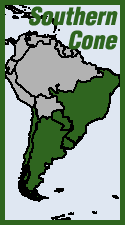 Uruguay’s lower house July 31 approved a bill to legalize cannabis, by a vote of 50 to 46. The bill now goes to the Senate, where lawmakers have assured President José Mujica they have a majority to approve it. Mujica's administration introduced the bill, and his signature is not in doubt. Laura Blanco, president of Uruguay's Cannabis Studies Association said the bill sent an "encouraging" sign to other Latin American nations. Under the law, citizens will be allowed to cultivate cannabis in their homes, limited to six plants per household. They would also be permitted to form cooperatives allowed to grow 99 plants. In addition, private companies can produce under the bill, their harvests to be bought by the government for resale to licensed pharmacies. To buy in pharmacies, citizens must submit their names into a confidential federal registry, and are limited to buying 40 grams per month. In a move to prevent cannabis tourism, the legislation restricts legal purchases to Uruguayans.
Uruguay’s lower house July 31 approved a bill to legalize cannabis, by a vote of 50 to 46. The bill now goes to the Senate, where lawmakers have assured President José Mujica they have a majority to approve it. Mujica's administration introduced the bill, and his signature is not in doubt. Laura Blanco, president of Uruguay's Cannabis Studies Association said the bill sent an "encouraging" sign to other Latin American nations. Under the law, citizens will be allowed to cultivate cannabis in their homes, limited to six plants per household. They would also be permitted to form cooperatives allowed to grow 99 plants. In addition, private companies can produce under the bill, their harvests to be bought by the government for resale to licensed pharmacies. To buy in pharmacies, citizens must submit their names into a confidential federal registry, and are limited to buying 40 grams per month. In a move to prevent cannabis tourism, the legislation restricts legal purchases to Uruguayans.
Cannabis use is already largely tolerated by Uruguaya's authorities. The government says the new law will undercut criminal networks that now smuggle cannabis from Paraguay. It is of course opposed by the right-wing opposition. Under Mujica, an outspoken former guerrilla, Uruguay has emerged as a laboratory for progressive policies, enacting a groundbreaking abortion rights law, moving to legalize same-sex marriage, and seeking to become a center for renewable energy ventures. (NYT, July 31)







Comments
Uruguay: 'a cutting edge experiment for the whole world'
Calling on Uruguay's Senate to approve his legalization bill, President Mujica said: "No one should think implementing this law would create disorder or encourage consumption. No where in the world has repression yielded results. We know we are embarking on a cutting edge experiment for the whole world." (Daily Maverick, Aug. 2)
$1 per gram in Uruguay
In an attempt to combat drug-trafficking, officials in Uruguay say they will begin selling legalized marijuana to its citizens for $1 per gram in 2014. That is considerable lower than the $2.50 estimation the country’s drug czar reported last year. (High Times, Oct. 22)